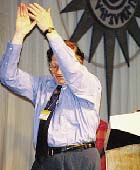
Issue
No 5
The Official Newspaper of the Lambeth Conference
Web highlights provided by Anglicans
Online
Front
page
of this issue
Spouses consider roles 'for better, for worse'
by Nan Cobbey
Photos by Harriet Long and Jeff Smith/Anglican World
With smiles, song and a soft stamping of bare feet, a dozen bishops' wives escorted one of "their own"---the first husband of a bishop--from the stage in the spouses' tent on Monday. At the conclusion of his part in the presentation on the role of the bishop's spouse, Dr Ian Jamieson, husband of Bishop Penelope Jamieson (Dunedin, New Zealand), called the other New Zealand spouses forward.
 |
Immediately the women, most of them barefoot, stepped onto the stage from their places in the front. Arranging themselves in rows behind Dr Jamieson, they began to sing a Maori song, accompanied with expressive movement and gestures telling of their support and care. Hardship and satisfaction The six spouses in the presentation told poignant stories of "better" and of "worse" in their lives, acknowledging challenges of racism, poverty, gossip, and loneliness. They also shared moments of "privilege" encountered as part of their partners' ministries. Though most had their own professions--nurse, academic, occupational therapist--they all described commitments to personal ministries. And finally, several offered advice: find a "soul friend," involve yourselves "outside the Church," rely on God.
The spouses on the panel were joined by Dr Elaine Storkey of the Institute for Contemporary Christianity in London's West End, a speaker well-known throughout Britain. She started her theological discussion with the Genesis accounts of Adam and Eve, but it was when she got to the topic of marriage that she especially set heads nodding. "Marriage is extraordinary: two
people come together and make reckless pledges to each other," she said."We image God as we love ... sometimes we love against the odds, sometimes we love when we are not loved back, sometimes we love sacrificially."
Elizabeth Appleby, wife of Bishop Richard Appleby (Northern Territory, Australia), described many "for betters"--including "caring for clergy spouses and their families, opportunities for leadership in your own right, and sharing with Aboriginal Christians in remote communities." Reflecting on the debit side of the equation, she said she was reminded of a clergy
friend's words: "Remember the mitre is also a crown of thorns." She also placed among the "for worses" the "loneliness at the top, gossip and speculation, expectations and stereotypes," as well as knowing the full story behind the bishop's decision or action, but not being able to say anything to protect him or her.
Struggling with apartheid's aftermath
Maggie Nkwe, nurse, midwife, founder of diocesan centres for families in crisis, victims of apartheid and farm workers, described how she and her husband, Bishop David Nkwe (Klerksdorp, Southern Africa), faced the challenges of life in South Africa. "Apartheid is said to be dead but some of us have not yet attended its funeral," she said. Mrs Nkwe told her audience that when her husband was appointed to his episcopal post he worried how she would feel. "It was not an easy choice," she said. "We moved from Soweto to Klerksdorp in two cars, into a house we struggled to get, because the so-called white church people in Klerksdorp h
 ad concluded we would stay in the township and not
in the so-called white suburb." She turned her talents to aiding her husband's
ministry and promoting justice. In 1991 the new bishop's wife organised the first
march by women in Klerksdorp against female abuse "to encourage women to participate
in gender issues."
ad concluded we would stay in the township and not
in the so-called white suburb." She turned her talents to aiding her husband's
ministry and promoting justice. In 1991 the new bishop's wife organised the first
march by women in Klerksdorp against female abuse "to encourage women to participate
in gender issues." Evangelising in Tanzania
Miriam Ntiruka, whose husband, Bishop Francis Ntiruka, was founding bishop of the Diocese of Tabora (Tanzania), told similar stories of hardship in their joint ministry. Since its founding in 1989, the diocese has grown from 6,000 members and 10 pastors to 15,000 members and
28 pastors. Being the wife of a bishop in Tanzania means "being the mother of the
bishop's family" and Mrs Ntiruka explained that in her case that meant being mother to their three sons as well as five children of relatives."This is quite common and we are happy to
do it," she said.
Husbands left with no clear role
Dr Jamieson confessed to being at a loss in his first days as a cleric's spouse. When his wife became vicar of a parish in Wellington, he confided, "I ended up as a Sunday School teacher, a mower of lawns, a sidesperson (usher) and as the relief organist," typical roles for a wife, "but in my case, I felt I had the freedom to choose them. For that freedom I was very glad."
Political challenges in Pakistan
Shamim Malik, wife of Bishop Alexander Malik (Lahore, Pakistan), regarded herself as co-worker when her husband was appointed bishop. The economic and political instability in Pakistan means church leaders must also act as political leaders. "The resulting work load is immeasurable--as is the toll it takes mentally, physically and emotionally." She added that "being a bishop's wife involves being a supportive companion in the bishop's ministry.
There is a saying in Urdu which, translated, says that the digit one, when doubled, becomes the digit eleven. In other words, it becomes 11 times as strong." Eleci Neves, wife of the Bishop Jubal Nevess (South Western Brazil), believes part of her role is to protect her husband from being "overwhelmed by the bureacracy of the Church." She described herself as
concerned with abandoned children, the elderly and those suffering from injustice.
Back to front page of this issue